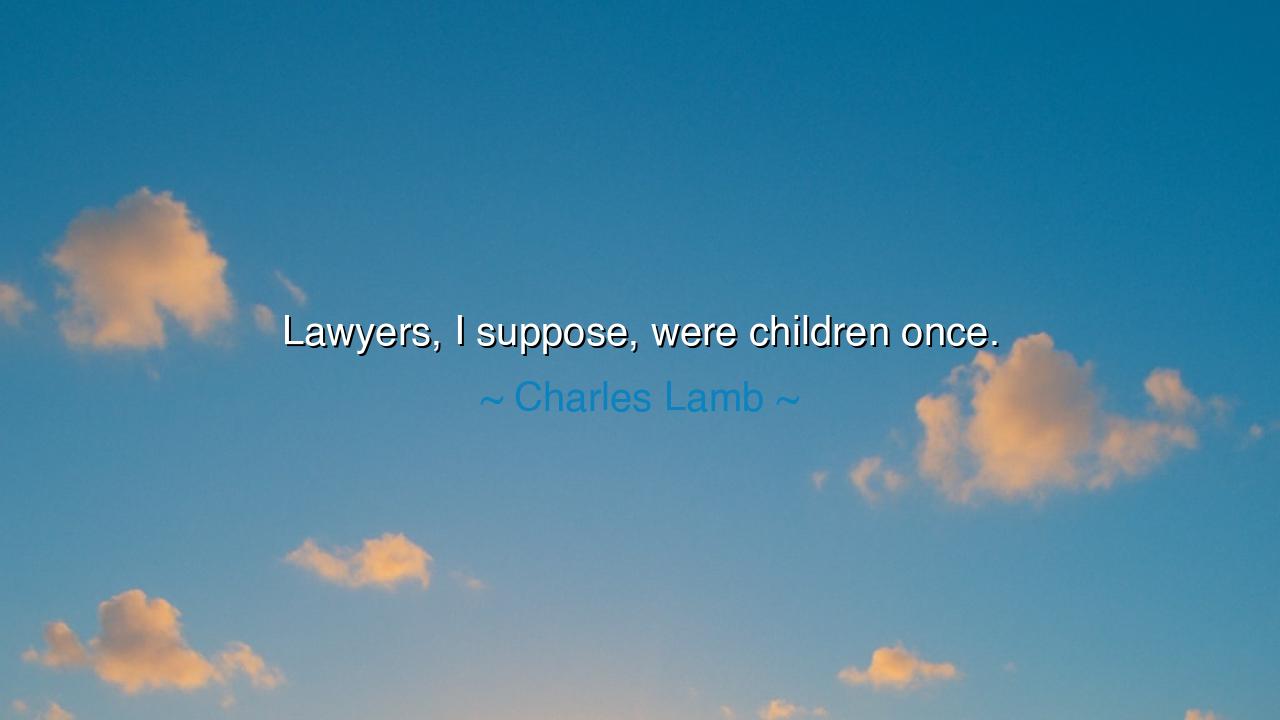
Lawyers, I suppose, were children once.






Hear, O listener, the gentle yet piercing words of Charles Lamb, who in his meditations upon humanity declared: “Lawyers, I suppose, were children once.” At first hearing, this utterance may seem but a jest, light as a feather. Yet beneath its humor lies a truth as deep as the roots of the oak: even those who wield the sternest authority, who stand clad in robes of power and speak in the tongue of law, were once fragile, innocent, and unformed. The mighty are not born so—they are shaped, molded by time, trial, and choice.
The meaning of this teaching is twofold. First, it humbles the lawyer, reminding him that he was once a child—playful, naïve, filled with wonder. The weight of law, with its statutes and judgments, was not always upon his shoulders. Second, it awakens compassion in those who behold the lawyer. For often we see only the hardened mask, the sharp arguments, the cold pursuit of victory. But Lamb reminds us that behind every such figure lies the memory of a child, once tender and pure, whose laughter was as innocent as any other. Thus, the quote softens the walls between us, teaching that no matter how exalted or severe a person seems, their beginning was the same as ours.
History itself testifies to this truth. Consider Sir Thomas More, the famed chancellor of England, who became a martyr for conscience. In the courts he was stern, in counsel he was wise, and before the executioner he was steadfast. Yet once he was a boy, running in the streets of London, learning his letters, and listening to tales by the fireside. To see him only as the austere man of law is to forget that within him remained the child who once dreamed of justice. Lamb’s words, then, remind us that the greatest figures of history are not born as statues, but as children, shaped by play, by parents, by the small joys and sorrows of youth.
The lesson resounds in modern times as well. Think of Ruth Bader Ginsburg, who stood before the highest court of America, delivering opinions that reshaped the rights of women and the oppressed. Yet she too was once a little girl in Brooklyn, reading books in quiet corners, nurtured by a mother’s hope. The towering achievements of her adulthood cannot erase the humble beginnings of childhood. Lamb’s gentle observation whispers across centuries: remember the child within every figure of authority, for it is there that their humanity resides.
Mark this well, O seeker: to see others only in their roles is to see them half. The lawyer, the judge, the politician, the soldier—all were children once. They carried dreams, they knew fear, they learned slowly, step by step. To remember this is to guard against both pride and scorn. For the mighty are not gods, and the lowly are not forever small. The child within each person is the seed of both greatness and frailty.
Let this be the lesson: treat all people with humility and compassion. When you face the lawyer who argues fiercely against you, remember the child who once played in innocence. When you behold the judge who seems immovable, recall that he too once stumbled in learning his letters. This memory softens anger and tempers pride. It reminds us that power is but a passing garment, and humanity is the true essence beneath.
Therefore, O child of tomorrow, carry Lamb’s wisdom into your dealings. See not only the robes of office, but the child within; not only the sharpness of words, but the innocence that once shaped them. And let this remembrance guide your own steps, lest in your rise to power you forget the child you once were. For the world does not need only lawyers—it needs men and women who, though grown, keep alive the tenderness, the curiosity, and the compassion of childhood.
Thus Charles Lamb’s jest becomes a teaching: “Lawyers, I suppose, were children once.” A reminder that greatness and humility walk hand in hand, and that to honor the child within each soul is to honor the very humanity that binds us all.






AAdministratorAdministrator
Welcome, honored guests. Please leave a comment, we will respond soon